The beauty world is no stranger to trends. From activated charcoal masks to rose quartz face rollers, we’ve seen — and often skeptically tried — it all.
But what if the secret to luscious, healthy locks was hidden away in an age-old tradition?
Allow us to introduce you to the magic elixir of rice water shampoo.
A Grain of History: Rice Water in Hair Products
Before diving into the science and secrets behind rice water, let’s journey back to its roots.
Ancient East Asian communities, particularly women in the Heian period (794 to 1185 AD) in Japan and the Red Yao tribe’s women in China, boasted floor-length hair that stayed black and healthy into their 80s.
In fact, the Red Yao women of Huangluo are known for the worlds longest hair — upto six feet long. Their secret? You guessed it: they would shampoo with rice water.
As the main staple in their diet, rice was more than just a food source. These women would wash and rinse rice, then collect the milky water residue and use it as a hair treatment. This technique wasn’t just a one-off whim but a regular, centuries-old ritual that preserved their hair’s beauty.
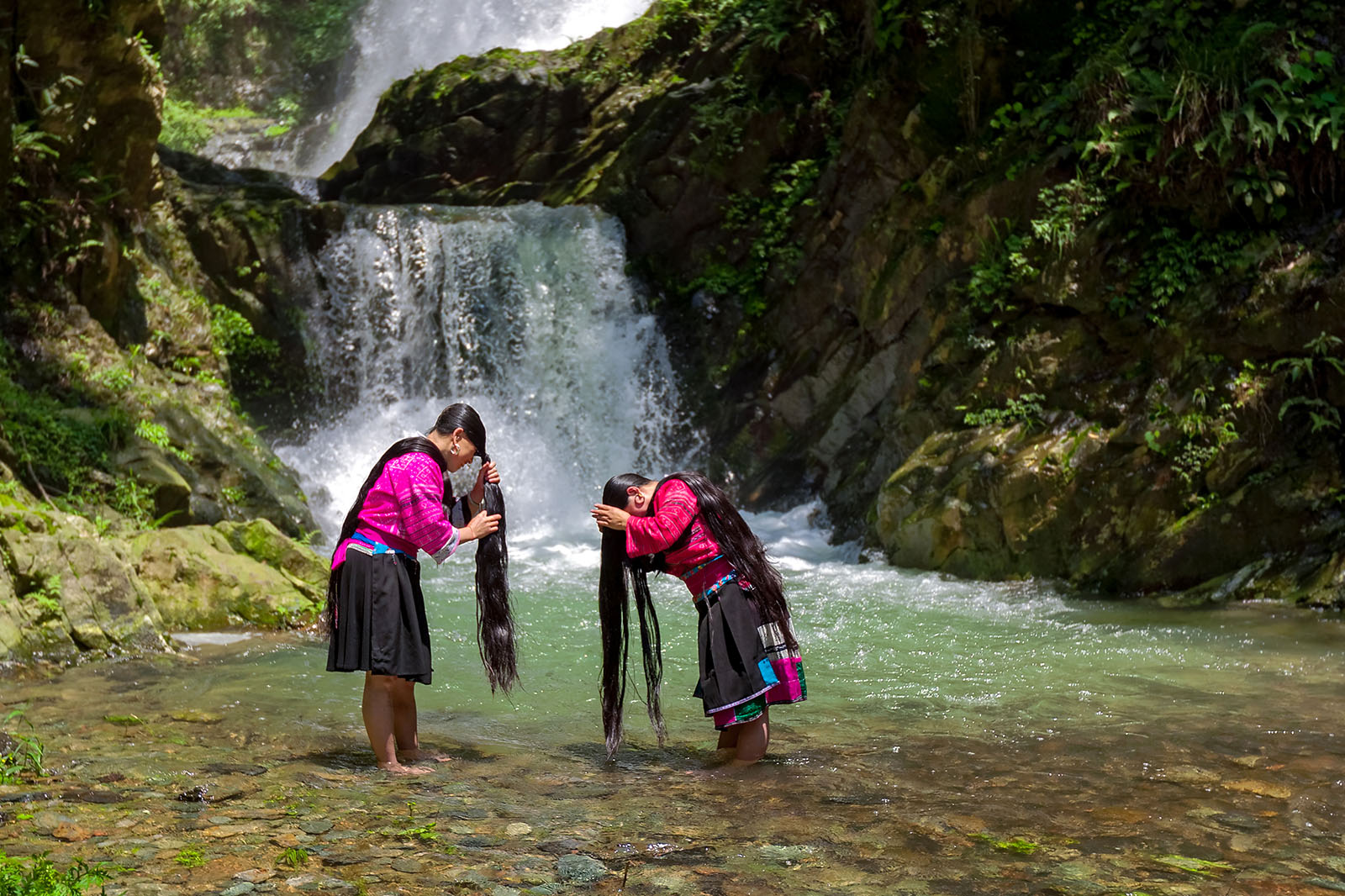
The Science Behind the Magic: Why Rice Shampoo Works
There’s always a science to beauty, even when it’s rooted in age-old traditions. And rice shampoo is no different.
It’s been studied by several scientists and researchers as a major ingredient for hair health — including the International Journal of Pharmaceutical Research and Applications and World Journal of Pharmacy and Pharmaceutical Sciences — all of which underline its efficacy.
But the best part? This isn’t restricted to any hair type. Whether you have straight, wavy, coily, or curly hair, a shampoo with rice water can work wonders for you.
Let’s pull back the curtain and delve deeper into rice water’s rich and potent chemistry and how it works wonders on our tresses.
Amino Acids
Hair, at its core, is primarily made up of proteins, and amino acids are the fundamental building blocks of these proteins.
Rice water is brimming with these amino acids. These essential nutrients are pivotal in strengthening the hair shaft, reducing hair breakage, and promoting hair growth.
Over time, environmental factors, styling tools, and chemicals can degrade these proteins, weakening the hair. The amino acids in rice water help replenish these lost proteins, restoring strength and vitality to the hair. This makes even the most lifeless hair feel and look smooth and glossy.
Vitamin B
Often referred to as the hair’s best friends, B vitamins, particularly B5 (pantothenic acid) and B8 (biotin), are essential in maintaining overall hair health.
They help repair damage and foster a conducive environment for hair growth by improving hair follicles, scalp circulation and enhancing hair elasticity.
Rice water, a natural source of these vitamins, provides a direct dose of nourishment to the hair, making it appear shinier and feel softer.
Vitamin E
This vitamin is renowned for its antioxidant properties, which means it is adept at combating oxidative stress caused by environmental free radicals. Oxidative stress can lead to hair thinning, premature graying, and even hair loss.
Integrating rice water shampoo into your regimen directly infuses your hair with Vitamin E, protecting against environmental assailants and the harsh effects of UV rays.
Inositol
This unique carbohydrate in rice water might not be as commonly discussed as the other nutrients, but its role is just as crucial.
Inositol has the remarkable ability to penetrate damaged hair and repair it from the inside out.
What makes it even more impressive is its ability to remain inside the hair even after rinsing, continuing to provide sustained protection and repair, guarding against further damage.
Minerals
Rice water also contains an array of minerals like magnesium, zinc, and selenium. These minerals are essential for maintaining a healthy scalp, preventing dandruff, and promoting hair growth.
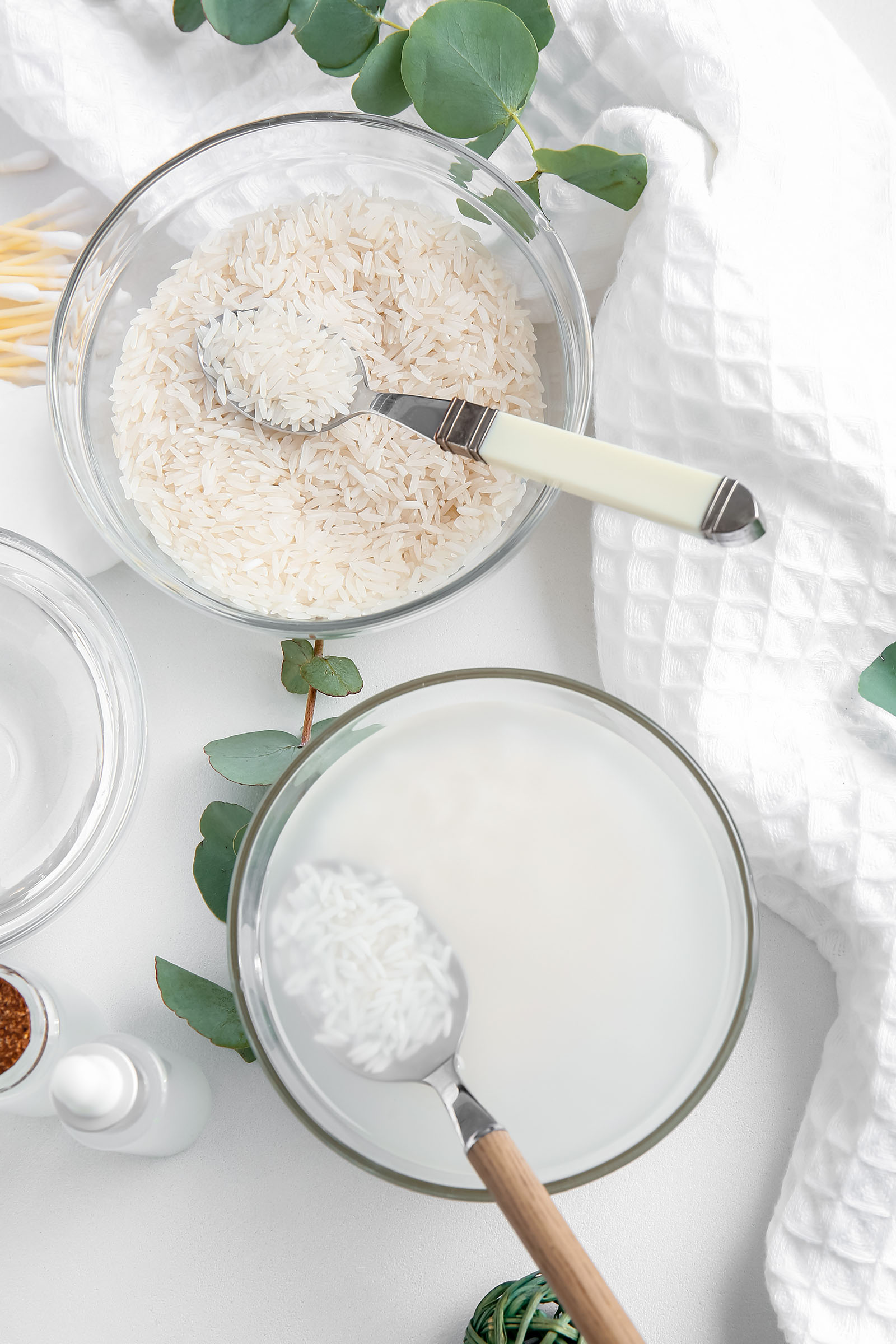
DIY vs. Store-bought Rice Water Shampoo: Which One’s for You?
While plenty of rice water products are available in the market, the DIY route offers a more personalized touch with natural ingredients and an absence of any harsh chemicals. It also has a lovely natural fragrance.
DIY Rice Water Shampoo
- Take half a cup of uncooked rice and rinse it thoroughly.
- Place the rinsed rice in a bowl and cover with water. Use a ratio of about 1:2 or 1:3 of rice to water.
- Let it sit for 30 minutes to an hour. Some people prefer to soak it overnight to allow more nutrients to soak into the water.
- Strain the rice, collecting the water in a separate container.
- Some people like to ferment the rice water by leaving it at room temperature for 24 to 48 hours before using it. Fermentation can increase the nutrient content and benefits for your hair; however, this is an optional step.
- Pour the rice water into a bottle, and voila! Your homemade shampoo is ready.
Store-bought rice shampoo
However, if DIY isn’t your thing, the market is rife with rice water shampoos infused with other beneficial ingredients. Ensure you choose a reputable brand and check for any added chemicals.
Here are the best options:
Briogeo Curl Charisma Rice Amino + Avocado Hydrating Shampoo: Fortified with rice amino acids and nourishing avocado oil, this superb blend battles frizz and dry hair, unveiling bouncy, hydrated, and luscious curls.
Shea Moisture Purple Rice Water Shampoo for Damaged Hair: Infused with exotic purple rice water, wild orchid, and sweet violet extract, it revives and nourishes your locks, leaving them silky, smooth, and full of life.
Mielle Rice Water Moisturizing Milk: Its unique formula penetrates each strand, providing moisture and nourishment that transforms dry, brittle hair into soft, luscious locks.
Kiehl’s Rice & Wheat Volumizing Conditioning Rinse: Its lightweight formula, infused with rice and wheat proteins, breathes life into flat hair, adding a natural bounce and shine.
Viori Hidden Waterfall Rice Water Shampoo Bar: Handcrafted with ancient Longsheng rice water, this solid shampoo bar cleanses, nourishes, and revitalizes your hair, revealing a healthy, glossy waterfall of locks.
Kitsch Hair Growth Rice Shampoo Bar: This compact, eco-conscious bar promotes robust hair growth, leaving your locks longer, stronger, and ready to dazzle.
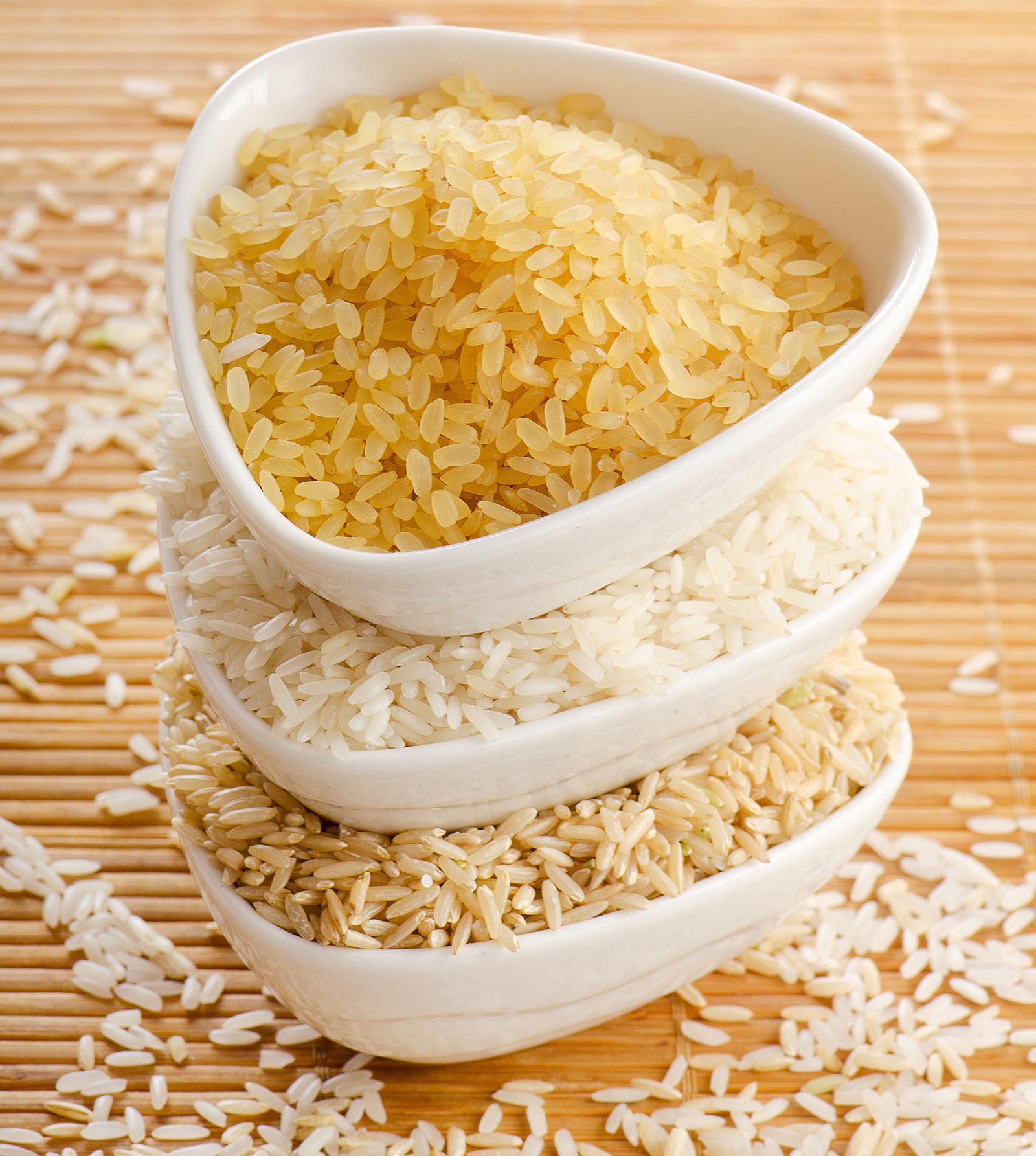
Using Rice Water As Shampoo: A Step-by-step Guide
Doing a shampoo with rice water is more complex than it sounds. Here’s a guide to get the best results:
Shampooing: If you’re using rice water as a shampoo replacement, wet your hair and then gently massage the rice water into your scalp and through your hair. Rinse thoroughly afterward with warm water.
Rinsing: Alternatively, you can use rice water as a rinse after shampooing. Pour it over your hair and scalp, let it sit for 3 to 5 minutes, and then rinse it with cold water.
Conditioning: Follow up with your regular conditioner to moisturize hair, or use a leave-in conditioner if the hair feels too dry.
Tips & Tricks for Optimal Results
Harnessing the full power of rice water requires more than just slapping it onto your hair and hoping for a miracle.
Whether you’re a newbie to the rice shampoo game or looking to optimize your regimen, these pointers will ensure that your hair reaps the maximum benefits.
Frequency Matters
Just because rice water is natural doesn’t mean it’s for daily use. While it provides proteins and vitamins, overusing can lead to a protein overload, making hair stiff and brittle.
For most hair types, 1-2 times a week is optimal. However, if you have protein-sensitive hair, reduce the frequency to once every 10-14 days.
Balance with Moisture
While rice water supplies protein, it’s essential to balance it with moisture. Alternate rice water treatments with deep conditioning sessions or use a moisturizing conditioner post-shampoo. This balance ensures hair remains soft, pliable, and resilient.
Customize with Essential Oils
Add a personal touch to your rice water by infusing it with natural essential oils. Depending on your hair needs, you can add lavender for a calming effect, rosemary to stimulate growth, or tea tree to combat scalp issues.
Not only do these oils enhance the benefits, but they also provide a pleasant aroma to the mix.
Use a Spray Bottle for Application
Transfer your rice water into a spray bottle for an even and controlled application. This ensures every strand gets its share of the goodness and reduces wastage. Plus, it’s easier to target specific areas, like the scalp or hair ends.
Cold Rinse Post Treatment
After leaving the rice shampoo on your hair for the desired duration, use cold water for the final rinse. Cold water helps seal the hair cuticles, locking in the nutrients and adding a natural shine.
Keep an Eye on Hair Response
Everyone’s hair is unique. While some might see immediate results, others require consistent use over a few weeks. Pay attention to how your hair responds.
If the hair texture starts feeling overly stiff or straw-like, it might be a sign to reduce the frequency or balance with more moisturizing treatments.
Pair with Rice Water Infused Products
Consider incorporating rice water-infused products like conditioners, serums, or leave-in treatments to bolster the effects. These products combine rice water with other beneficial ingredients, providing a comprehensive hair care solution.
Storage is Key
If you make rice water in batches, ensure it’s stored correctly. Freshly made rice water can be stored in the refrigerator for up to a week.
For longer shelf life, consider boiling the rice water (turning it into a decoction) and adding a few drops of vitamin E oil as a preservative.
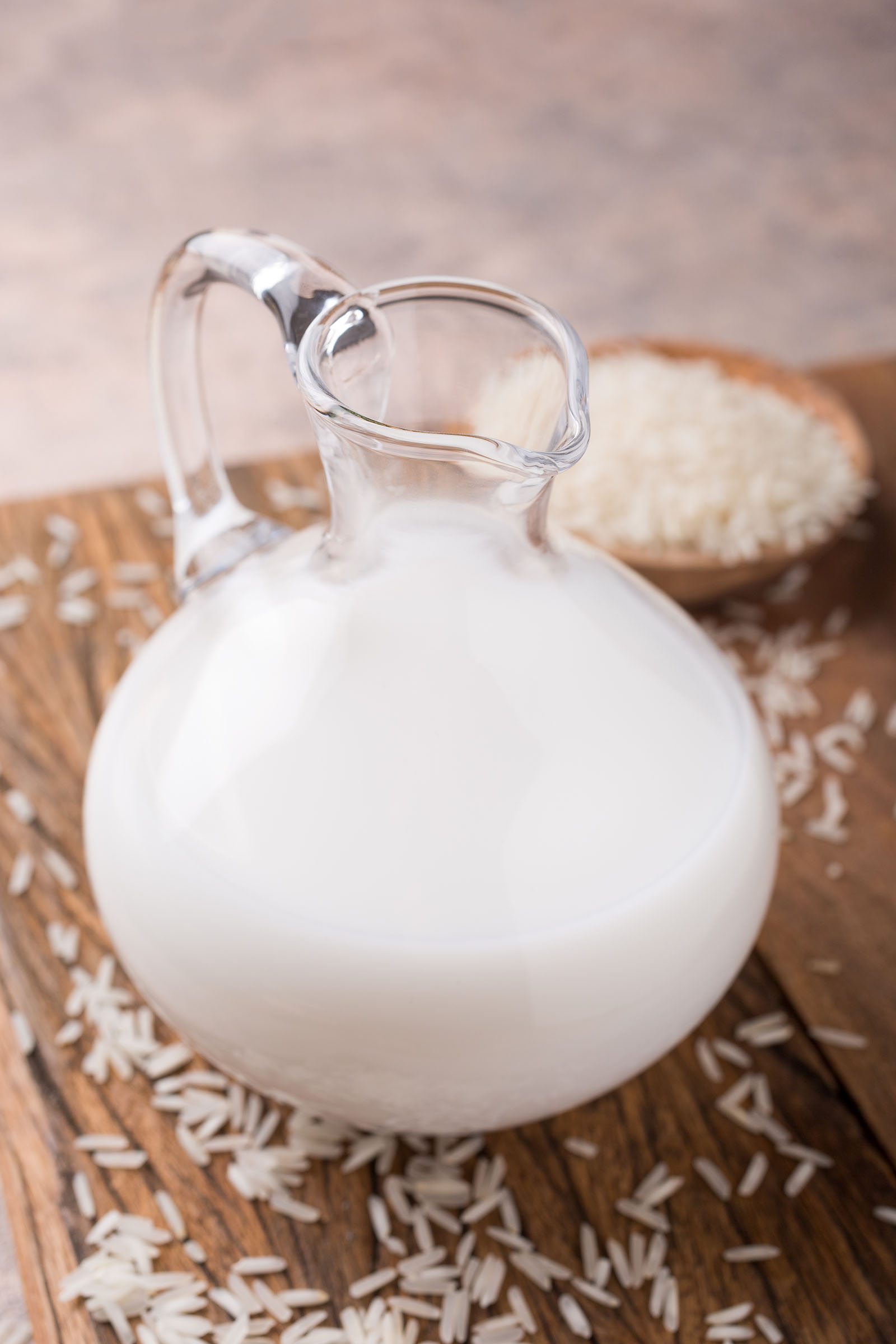
FAQs: Rice Water Shampoo
Here are the most frequently asked questions about rice water for the hair.
Is rice water shampoo good for your hair?
Yes, rice water shampoo is beneficial for hair. It is rich in amino acids, vitamins, and minerals that nourish, strengthen, and promote hair growth. It can also moisturize dry hair, enhance shine, and improve overall hair health.
What are the negatives of rice water for hair?
Overusing rice water can lead to protein buildup, making hair stiff or brittle. Finding a balance and not relying solely on rice water for hair care is essential.
Does rice shampoo thicken hair?
While rice shampoo directly doesn’t thicken hair, the nutrients in rice water can strengthen hair and reduce breakage, leading to fuller-looking hair over time.
Can I leave rice water in my hair for two days?
Leaving rice water in your hair for extended periods is not recommended. Prolonged exposure can lead to protein overload and dryness. It’s best to rinse it off after 20-30 minutes.
Is rice water a keratin treatment?
No, rice water isn’t a keratin treatment. While both offer strengthening benefits, keratin treatments involve adding the protein keratin to hair. In contrast, rice water provides a mix of proteins, vitamins, and minerals.
What is rice water?
Rice water is the starchy liquid obtained after soaking or boiling rice. It’s rich in vitamins, minerals, and amino acids, making it a beneficial hair treatment.
Can I use any type of rice for a rice water shampoo?
Yes, whether it’s white, brown, basmati, or jasmine, all rice types contain beneficial properties. However, white rice is most commonly used due to its higher starch content.
Can rice water lighten hair?
No, rice water does not have natural bleaching agents. It can, however, add shine, making hair appear brighter. This also makes it safe for color-treated hair.
Is rice water shampoo suitable for all hair types?
Yes, from straight to curly, all hair types can benefit. However, the frequency and combination with other treatments might vary.
Will rice water help with hair loss?
Rice water strengthens hair and improves scalp health, potentially reducing hair fall. However, it’s not a direct remedy for alopecia or severe hair loss conditions.
Is store-bought rice water shampoo as effective as DIY?
Store-bought versions often combine rice water with other ingredients for enhanced benefits. While effective, DIY gives you a pure, unadulterated version.
Do I shampoo after using rice water?
You can use rice water as a pre-shampoo treatment or post-shampoo rinse. If used post-shampoo, ensure to rinse it out with cold water.
Is fermented rice water better than plain rice water for shampoo?
Fermented rice water has a lower pH, closer to our hair’s natural pH, and has enhanced nutrient content. However, it also has a stronger smell. Both types offer benefits, so choose based on preference.
Have you ever tried rice water for your hair?
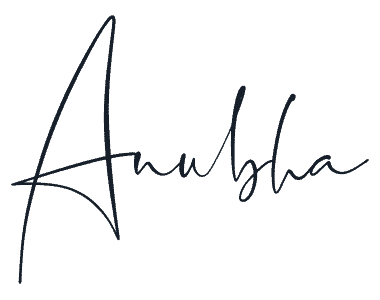
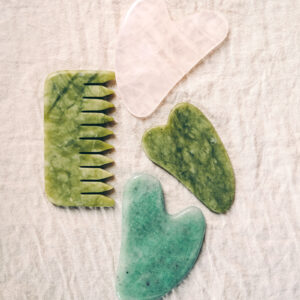

Leave a Reply